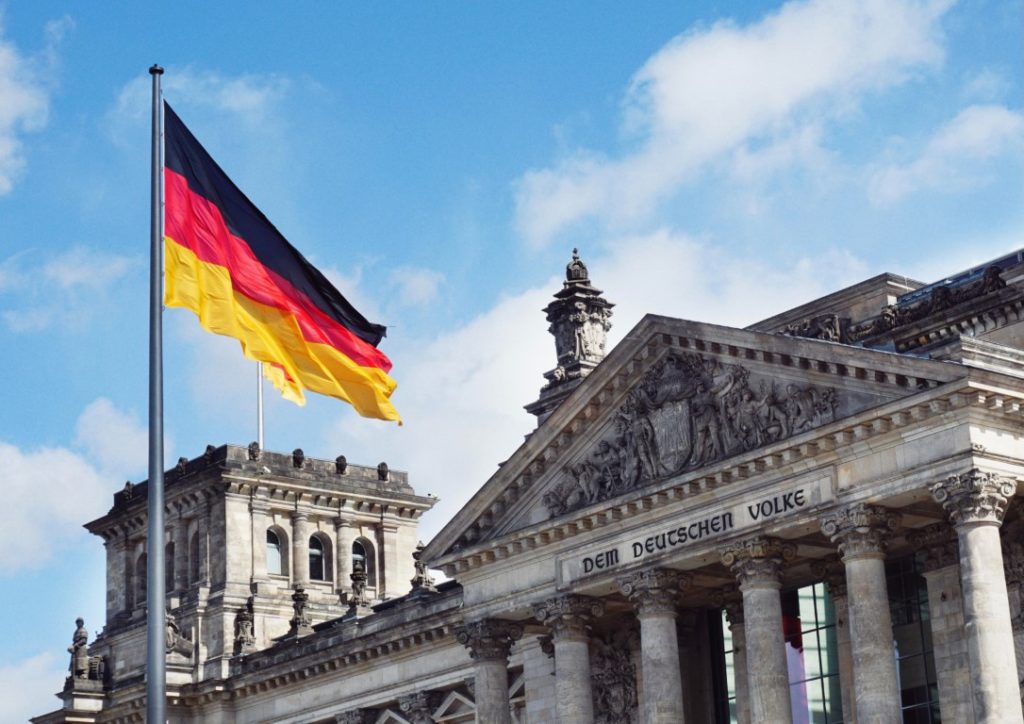Why The German National Anthem Has Only One Stanza Posted by Sten on Jul 1, 2021 in Culture, Language, Music, Traditions
Two days ago, the German Fußballelf (f, national football team) played England in the Wembley Stadium as part of the Euro 2020. Before the game, each team sings their Nationalhymne (f, national anthem). The German one came on, and despite the booing from some disrespectful fans, they sang their Einigkeit und Recht und Freiheit. The Dutch subtitles, however, said they sang something else. Something bad! It blew up on twitter, excuses were made, yet it upset quite some people! But why?
Deutschland über alles in der Welt
Dit zingen de Duitsers toch al een tijdje niet meer @tt888 pic.twitter.com/ulXvarScWn
— Niels Heithuis (@nielsheithuis) June 29, 2021
Germany’s Nationalhymne is a peculiar one. It is a part of the Lied der Deutschen also known as Deutschlandlied (n, Germany song). It was first confirmed, with all three stanzas, as the Nationalhymne in 1922, in the Weimar Republic. After World War II, in 1952 in the Bundesrepublik, it was decided that the song would remain the German anthem. Only in 1991, after the Wiedervereinigung (f, reunification), it was decided that the third Strophe (f, stanza) is the official Nationalhymne der Bundesrepublik Deutschland. This means that the Deutschlandlied, technically, is not the Nationalhymne anymore, but only a small part of it.
Why was this done? What made the first and second Strophen so bad that they were excluded from the Nationalhymne?
Well. The song begins with Deutschland, Deutschland über alles (Germany, Germany above everything). August Heinrich Hoffmann von Fallersleben (what a mouthful) wrote the song in 1841, when Germany was still a Flickenteppich of tiny Fürstentümer (princedoms). With the French claiming land of these German princedoms, Hoffmann wrote this song to make Germans feel more nationalistic, and put Germany’s Einheit (unity) before each of the little Fürstentümer. Fair enough.
However, later, when Hitler wanted to conquer the entire world, the meaning of the words was interpreted as German Größenwahn (m, megalomania). As the Bundesrepublik wanted to distance itself as far as it could from the Nazi era, it was obvious that these words couldn’t be sung anymore. Even if their origin had nothing to do with Nazism, but with German Einheit.
The first Strophe isn’t verboten (forbidden), but it is frowned upon in Germany. So singing it becomes news, like the AfD party-wing der Flügel did some time ago at their convention:
Like raising your hand up with the Nazi salute or saying Heil Hitler, singing that first Strophe is seen as disrespectful and can get people to label you as Nazi.
The second Strophe says Deutsche Frauen, deutsche Treue, deutscher Wein und deutscher Sang sollen in der Welt behalten ihren alten guten Klang (German women, German loyalty, German wine and German song shall retain in the world their old beautiful chime). It comes across as somewhat schwülstig (pompous), when you keep in mind how all things German were seen as the best in Nazi times.
Einigkeit und Recht und Freiheit
That leaves us with the third Strophe:
Einigkeit und Recht und Freiheit
Für das deutsche Vaterland!
Danach lasst uns alle streben
Brüderlich mit Herz und Hand!
Einigkeit und Recht und Freiheit
Sind des Glückes Unterpfand –
Blüh im Glanze dieses Glückes,
Blühe, deutsches Vaterland!
(Unity and justice and freedom
For the German fatherland!
Towards these let us all strive
Brotherly with heart and hand!
Unity and justice and freedom
Are the safeguards of fortune;
Flourish in the radiance of this fortune,
Flourish, German fatherland!
Flourish in the radiance of this fortune,
Flourish, German fatherland!)
So striving for unity, justice and freedom sounds pretty nice. Especially because, when the Bundesrepublik was founded, East and West Germany weren’t united. So the Hymne pointed to that, too.
And even after the Wiedervereinigung, it was seen as the right way to go, making this the official German national anthem.
Fix the National Anthem!
So after all this, you’d think that it’s pretty easy to simply sing the third Strophe and you’re done. However, like you can see in the video above and the mishap of the Dutch subtitlers, getting it wrong can be very painful. While the American singer is belting the first Strophe, the German team and their fans are singing the third one as loud as they can against it. Also note the mistake in the video that the first Strophe was only sung during Nazi rule. It gives you an idea how the original intention of those words is gone entirely.
Why does this happen? Well, when you Google “deutsche Nationalhymne“, you get the German Wikipedia page first. The link to the official website of the Bundesrepublik follows right after. What happens when you google “German national anthem“? You get a Wikipedia link to the Deutschlandlied. You scroll down and boom – there are the three Strophen. The English page does note that only the third Strophe is sung as the national anthem, but it gets buried in the text. The German solution is better, with a unique Wikipedia page for the anthem and a unique one for the Deutschlandlied.
I suppose this is a lesson that, even when things seem obvious, it is always a good idea to double check that you’re not missing something important!
With all this confusion, perhaps it’s time to change it up? There is some discussion about it:

Build vocabulary, practice pronunciation, and more with Transparent Language Online. Available anytime, anywhere, on any device.





Comments:
Rick:
Please remember that it was a minority of all England fans booing in that disgusting manner and the least well educated of England fans. The rest of us are ashamed of them.
Sten:
@Rick That’s fair. Fixed it 🙂
Rick:
@Sten Thanks Sten
Keep up the good work ?